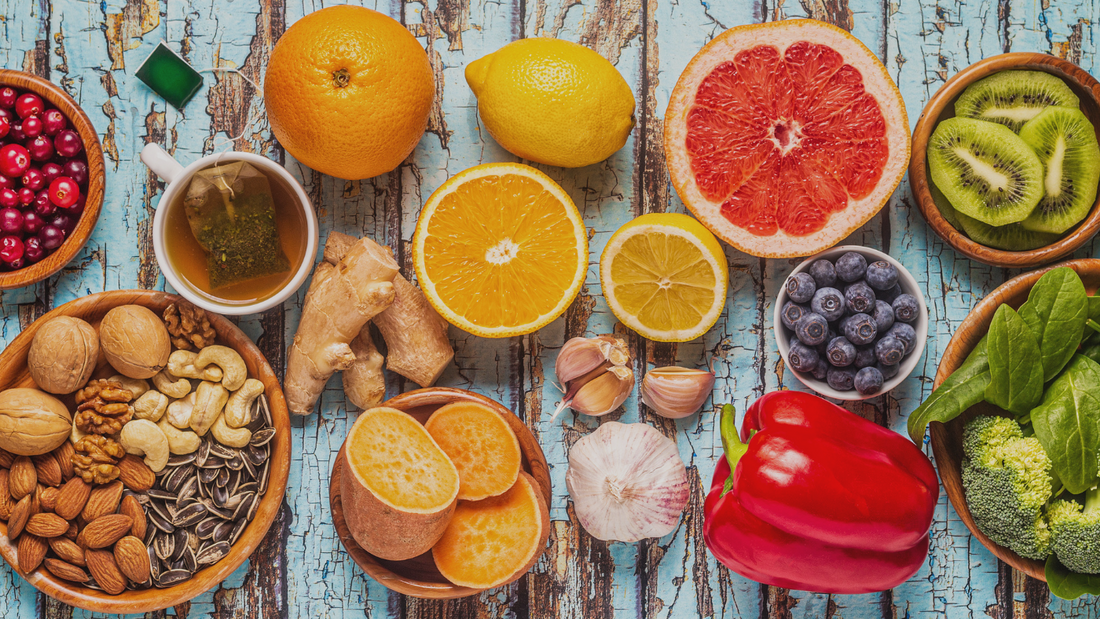When the fall and winter season arrives, so does the cold/flu season. Here are some ways to help boost your immune system.
Vitamin C
Vitamin C, also known as an ascorbic acid, is a water-soluble vitamin that is known to help support a healthy immune system. Not only does it help support our immune system, but it is essential for the growth and repair of the tissue throughout our body, helps heal wounds, repairs & maintains health bones, teeth, skin, and cartilage. Since our bodies don’t produce it, we must get this vitamin from the foods that we eat or through supplements. Vitamin C doesn’t guarantee that you won’t catch the cold or flu, but it can shorten the length of the cold symptoms with high doses of this vitamin.
The most important source of vitamin C nutrient foods that we eat/ drink are citrusy foods and juices such as orange, pineapple, and lemon juice. Other sources that are packed with this vitamin are foods such as tomatoes, potatoes, strawberries, green & red bell peppers, broccoli, brussels sprouts, kiwi, among other foods. These foods can be eaten raw or cooked, but as a reminder, fruits and vegetables tend to lose their nutrients when heated.
Vitamin D
Vitamin D is one of the most important vitamins our body needs that has a powerful healthy effect on several systems in our body. Vitamin D is a fat-soluble vitamin that is found in foods, dietary supplements, and the sun. It is a necessary nutrient that aids calcium absorption to give us what our body needs for maintaining strong and healthy bones while supporting the immune system. Sunlight is the main source of absorbing this nutrient and since we avoid being outside during the colder seasons, that means we can become vitamin D deficient.
Vitamin D is a fat-soluble vitamin which means it does not dissolve in water. Because it is not dissolvable, it is absorbed into your bloodstream when it is consumed with high fatty foods and is stored. There are two types of D vitamins that occur naturally: Vitamin D-2 and Vitamin D-3. Vitamin D-3 is found in animal fats and Vitamin D-2 is found in plants such as mushrooms. It is recommended that people of all ages get 400-800 IU or 10-20mcg daily.
The healthiest foods that are the highest in vitamin D are salmon (or any fatty fish), mushrooms, cod liver oil, canned tuna, sardines, egg yolks, cow’s milk, soy milk and plant-based milk, orange juice, and beefy liver.
Of course, there are a lot of other foods that contain Vitamin D. The key is to make sure you’re getting adequate amounts to reach the daily intake. Look at the nutritional facts to see how much Vitamin D each food contains and the serving for it.
Vitamin Supplements are another route to go to know that you’re getting the recommended daily/weekly dosage. It is fast, gets absorbed into the body, leaving you stress free without worrying whether you got enough sun or ate enough fortified foods.
Zinc
Zinc is a mineral that is very important to our bodies to keep our immune system strong, helps heal wounds and supports our normal growth. Unlike Vitamin D, becoming zinc deficient is rare simply because most diets provide more than the recommended dietary allowance. Food sources that contain zinc are red meat, poultry, oysters, fortified cereals, whole grains, beans, and nuts.
The recommended daily amount of zinc for adult women is 8mg and 11mg for men. Taking Zinc once you feel cold symptoms appear can also help shorten the length of the cold/flu symptoms.
Magnesium
Magnesium, like zinc, is an essential mineral for nutrition. It helps maintain normal nerve and muscle function, it supports a healthy immune system, it helps keep the heartbeat steady, and helps the bones remain strong. Zinc also contributes to adjusting blood glucose levels and aids in the production of energy and protein. Diets that are high in protein, calcium, and vitamin D will need more magnesium in their diet.
Magnesium is mainly found in leafy, dark green vegetables. Other sources that magnesium is found in are bananas, dried apricots, avocados, almonds, cashews, peas, beans, soy flour, tofu, milk, and whole grains such as brown rice & millet.
The recommended daily dose intake for magnesium is 400-420mg for adult males and 310-320mg for adult females.
Making sure we are getting the daily recommended intake for vitamin C, vitamin d, zinc, and magnesium is very important during the cold and flu season. Along with these vitamins and minerals, it is also essential to make sure we are taking care of ourselves by getting enough rest each night, stressing less, 30-45 min of exercise, washing our hands, and eating nutritious foods. As a reminder, before you start taking any supplements, even if it’s a higher dose of vitamin c, be sure to check with your primary care physician before taking any supplements.

